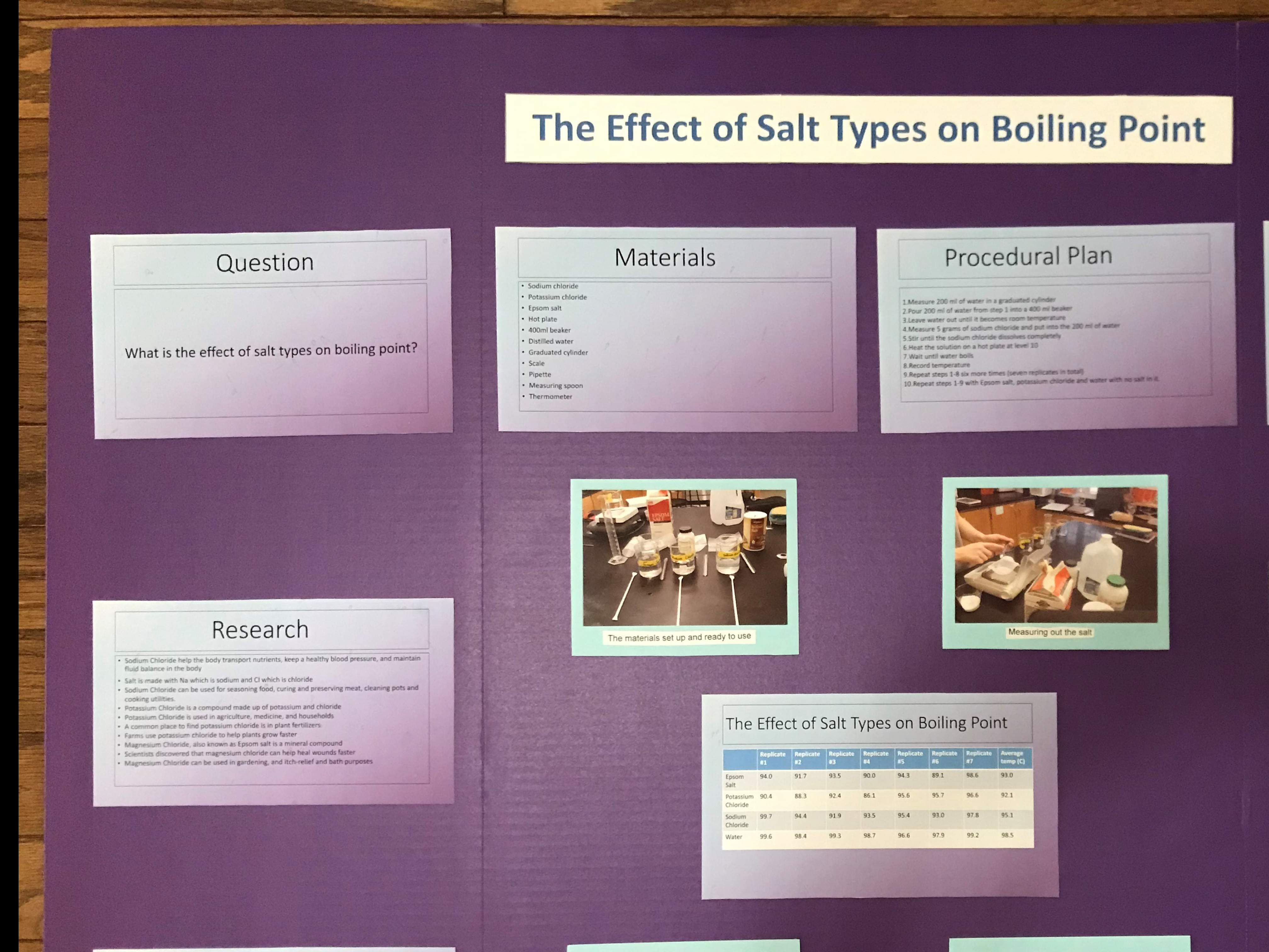The Effect of Salt Types on Boiling Point
Abstract:
The purpose of the experiment was to see what type of salt solution had the highest boiling point. The hypothesis was: If sodium chloride, potassium chloride, and magnesium chloride solution’s boiling points are compared, then the magnesium chloride will have the highest boiling point. The constants are as follows: the amount of water, the number of replicates, and the amount of salt mixed with water. The control was distilled water with no salt. The independent variable was the types of salt and the dependent variable was the boiling point. The boiling point was measured with a handheld thermometer that went to the tenths place. The average of each salt type’s boiling point was calculated. Magnesium chloride was 94.3 degrees Celsius, potassium chloride was 95.6 degrees Celsius, sodium chloride was 95.4 degrees Celsius, and lastly distilled water was 96.6 degrees Celsius. The hypothesis was rejected. Using salt will decrease the boiling point of the water. Magnesium chloride had the lowest boiling point of 94.3 degrees Celsius, while distilled water had the highest boiling point of 96.6 degrees Celsius. If given the chance to redo the experiment in the future, more than seven replicates should be tested and a larger volume of water should be used. In addition, a thermometer that can measure past the tenths place should be utilized.
Bibliography/Citations:
No additional citationsAdditional Project Information
Research Plan:
Title: The Effect of Salt Types on Boiling Point
Question/Problem: Do different salt types added in water affect its boiling point?
Hypothesis: If sodium chloride, potassium chloride, and magnesium chloride solution’s boiling point are compared, then the magnesium chloride will have the highest boiling point.
Materials:
Sodium chloride, Potassium chloride, magnesium chloride, Hot plate, 400ml beaker, Distilled water, Graduated cylinder, Scale, Pipette, Measuring spoon, Digital Thermometer
Procedure:
- Measure 200 ml of water in a graduated cylinder
- Pour 200 ml of water from step 1 into a 400 ml beaker
- Leave water out until it becomes room temperature
- Measure 5 grams of sodium chloride and put into the 200 ml of water
- Stir until the sodium chloride dissolves completely
- Heat the solution on a hot plate at level 10
- Wait until water boils
- Record temperature
- Repeat steps 1-8 six more times (seven replicates in total)
- Repeat steps 1-9 with each salt and water with no salt in it.
Data Analysis: The means were calculated and then graphed on a bar graph. The x-axis was Salt Types and the y-axis was Boiling Temp (degrees C)
Risk Assessment: Common lab safety rules are relevant. Eyewear used for safety purposes must be on the face at all times during the experiment. If solutions contact the skin or eyes, flush with water. Do not ingest any lab materials. Use care when using a hot-plate and use protective gloves with hot glassware. If skin touches hot-plate or is burned, run under cold water.
Works Cited:
Haskins, Julia. “What Is Sodium Chloride and How Is It Used?” Healthline, Healthline Media, 29 Sept. 2018, www.healthline.com/health/sodium-chloride.
Hills, John M., et al. “Salt.” Encyclopædia Britannica, Encyclopædia Britannica, Inc., 19 Nov. 2018, www.britannica.com/science/salt.
Markgraf, Bert. “How Many Valence Electrons Does Sodium Have?” Sciencing, 2 Mar. 2019, sciencing.com/how-many-valence-electrons-does-sodium-have-13710213.html.
Oppenheimer, Lucy. “What Is Potassium Chloride?” WiseGEEK, Conjecture Corporation, 3 Sept. 2019, www.wisegeek.com/what-is-potassium-chloride.htm.
Zimmerman, Edith. “A Brief History of Epsom Salt: What Is It, Exactly? Why Do We Bathe In It? And, Really? People Drink It?” Apartment Therapy, Apartment Therapy, LLC., 3 May 2019, www.apartmenttherapy.com/a-brief-history-of-epsom-salt-242655.

